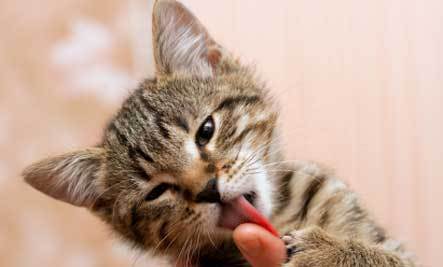Dogs may lick our faces — remember Lucy from “Peanuts” exclaiming, “Aaack, dog germs!” after a kiss from exuberant beagle Snoopy? — but cats are more refined in their public displays of affection. When your cat licks you, usually after a mock-bite or firm grab with his paws, she’s doing what her mother did during the early weeks of her life : providing a good cleaning that also speaks of caring and belonging. You’ve seen cats licking each other, helping in the grooming ritual, especially around the hard-to-reach ears and top of the head. But why is Kitty inspired to lick your arm or toes — or even your hair? Here’s what we’ve discovered.
Territorial Rights
Being licked is the first tactile experience your cat remembers — that washcloth feeling of her mama cat’s tongue thoroughly rubbing her coat, ears and every part of her little body. A mother cat initially washes her babies to remove the afterbirth fluids and to stimulate the kittens’ breathing. She’ll also clean them whenever they return to the nest, firmly re-establishing her scent on them. For cats both male and female, licking is a social exchange as well as a rite of cleanliness. Cats groom each other to remove debris and share scents, just as cats scratch in a favorite place where the scent glands of their paw pads will mark the territory as their own. When your cat licks you, she’s cleaning you up and claiming you — just as she would for a feline friend or litter mate.
What Licking Feels Like to a Cat
Some experts believe that orphaned kittens or those weaned too early from their mothers and litter mates develop oral behaviors such as suckling and licking, and exhibit these babyish habits into adulthood. But as with so much about cats, that’s a generalization. Licking is a comforting, soothing sensation to cats, and feels like the gentle stroking of your hands petting them. If a cat licks you, she’s returning that favor: She figures, who wouldn’t enjoy being petted and assured of affection?
Excessive Licking
If an older cat who’s never shown such affection suddenly begins licking you or suckling at your clothing, pay close attention to this change in behavior. Cats that start vigorously licking themselves may be seeking relief from a skin irritation, fleas, an insect bite or an infection. Help soothe Kitty by examining her skin and fur for problems, and ask your vet to recommend the right treatment.
If your cat’s licking is not linked to illness and you simply cannot tolerate the ticklish feeling of her tongue, do not punish her for this normal behavior. Try gently discouraging your cat by moving away from her when she starts licking. Spritz your arms or hand with lemon juice, an immediate feline turn-off. Offer her a stuffed terrycloth toy to lavish her affection on instead, or just turn the tables and pet her lavishly, assuring her that you love her even if you don’t like the licking.
Adapted from an article on Animal Planet




